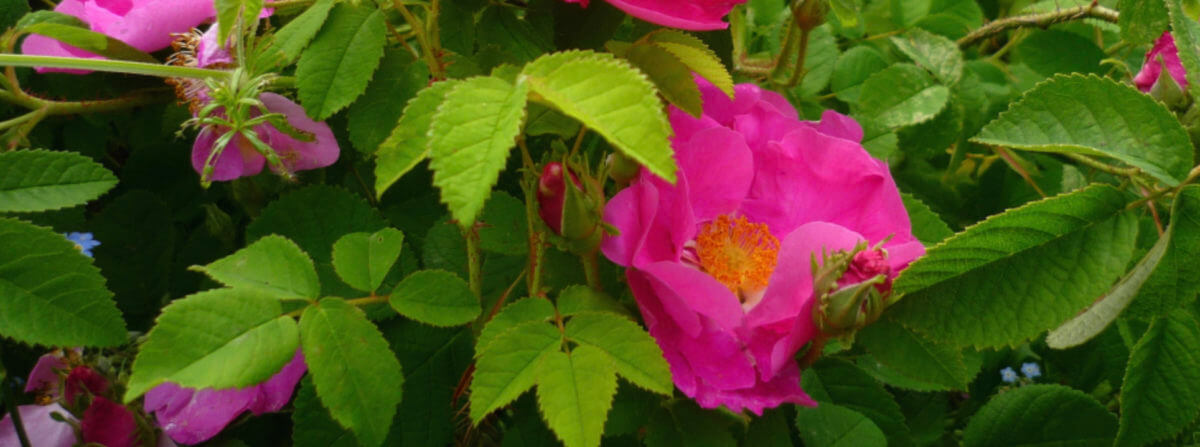This article by Westgarden Steward Jules LeDrew introduces rose medicine: Flower and Hips. Harvest is early June through Summer Solstice and fall.
This time of year most plants show their full identities and character through their unique and colorful displays of flowers. You will find our native wild rose, Nootka Rose, on beaches and holding up hillsides in sandier soils across the PNW. While she may be less eye popping with smaller light pink flowers, her medicine can be as significant as some of the most prized roses in the world. These include the Damask rose, at home in our own Westgarden. Rosa Damascena is native to the Valley of the Roses in Bulgaria, which is also the heart of the rose essential oil industry trade. Records of its huge popularity go back to the Ottoman Empire. Rose medicinal use stems from many cultures, including ancient Greece, and dates back thousands of years.
Rose offers a depth of medicine that not many plants hold on their own. She tends to culturally symbolize delicate feminine and romantic love, and in reciprocity with human physiology and psyche she possesses powerful energetics that allow for profound shifts of perspective and the nurturing of the heart needed to create real change. Whether the heart ails of grief, anxiety, or depression came first, or whether the heart disease did, she restores the necessary union between heart and mind that can begin to reach the entirety of the cardiovascular system. Her multilayered medicine works on many systems and includes compounds like tannins and polysaccharides that tone and nourish the tissues of the heart and digestive system. Often, what is perceived as Rose’s gentle calming action is in actuality her medicine reaching the deep roots of health-altering issues. This is a firm yet gentle reminder that herbal medicine seeks to heal the root of the cause of health imbalances and not simply relieve symptoms like the common band-aid approach we have in conventional medicine.
Rose essential oil is not only one of the most expensive, luxurious, and prized essential oils, but in the world of volatile aromatic compounds this oil is arguably one of the most complex and versatile. There are many variables in our modern world that put stress on our hearts, whether we realize it or not, and the scent of rose alone will protect the tissues of the heart and work to repair old damage. It encourages feelings of patience, compassion, and love and a soft, but strong heart that is open, yet protected. Roses are often used to promote healthy spiritual and emotional boundaries and protection and have a gentle, calming action that is associated with soothing vulnerability, anger, grief, broken-heartedness, and lack of self-love. Rose allows expansion into the very categories of physiological healing that we most need. Rose is anti-inflammatory, an astringent, euphoriant, cardiotonic, and nervine.
Rose petals can be made into cosmetics, oils, teas, water spritzers, elixirs, vinegars, glycerites, and tinctures. Rose essential oil is also available commercially, but only recommended from high quality reputable companies that source ethically and sustainably.

